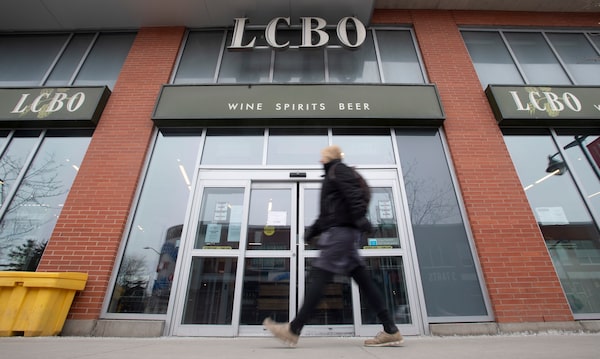
A person walks past an LCBO in Ottawa on March 19, 2020. Ontario has classified the provincial liquor stores as essential services, allowing them to remain open while other businesses are in lockdown to slow the spread of COVID-19.Adrian Wyld/The Canadian Press
There was significant shock when the LCBO and SAQ were permitted to remain open and classified as essential services while other businesses were shuttered in a bid to halt the spread of the novel coronavirus. Liquor stores have closed in other parts of the country; why not here?
The best rationale comes from public-health authorities who point to the consequences of cutting off supply for persons with alcohol dependency, which would put increased pressure on hospitals and emergency services. Keeping liquor stores open also prevents a run on grocery chains already struggling to maintain safe environments and supply for shoppers.
With cocktail hours and dinner parties now held online, there’s a new way to socialize
A quick scan of the headlines makes it clear that wine is a luxury. We can manage without it. But for Canadians confined to home in these uncertain times, it can be a comfort. A taste of normality.
When asked why he wasn’t shutting down the SAQ, Quebec Premier François Legault explained, “Sometimes a glass of wine may help” with the stress.
For families sitting down to dinner or friends staging a cocktail hour via video conferencing, a glass of wine or digital drink can help make the moment more meaningful. Greek and Roman poets celebrated wine along with food and art for its ability to enhance daily life. The ritual of coming together and sharing wine continues to connect us.
As COVID-19 continues to spread, some provinces have used emergency powers to enforce physical distancing by closing “non-essential" businesses. Companies whose employees work from home, or who use digital storefronts, can continue to do so. But in many provinces, only services deemed essential will have physical locations open. These include:
- Food and liquor: Grocery and convenience stores, restaurants (take out and delivery only). Pet-food stores included. Liquor stores are open on special hours.
- Utilities: Energy, water, telecom and garbage-collection services will continue to run.
- Shelters: Services will continue for homeless people and survivors of domestic violence.
- Banks: Financial services are on every province’s essential list, but some banks may have reduced or changed hours at branches.
- Government services: Health care and online higher education will continue, but public schools are closed.
- Transportation: Public transit, taxis and postal delivery are running, as are transportation sectors needed for supply chains.
Read the full list of essential services in Ontario, Quebec, B.C., Alberta, Saskatchewan, Manitoba, PEI and Newfoundland and Labrador.
You can also read The Globe and Mail’s digest of the latest news about COVID-19′s spread around the world and sign up for the Coronavirus Update newsletter.
As someone whose writing and teaching career is wholly connected to wine, it’s absolutely essential, even if it’s seen as being pretty insignificant in the grand scheme of things right now. It’s also pretty essential to the nearly 700 wineries across Canada that help sustain agricultural communities, support tens of thousands of jobs and attract millions of tourists each year. The same could be said for the economic impact of companies that import and retail beverage alcohol across the country.
Each spring, I receive a steady stream of soon-to-be-released newly bottled wines from wineries across the country. Import agents with upcoming releases also contribute samples. I continue to taste through these selections as usual, although this is the first time I’ve ever felt the urge to clean and disinfect each bottle before thoroughly washing my hands, but there’s no certainty these wines will be released as a matter of course.
There may be more disruptions and lockdowns, but come what may, wine is essential. It might actually matter more today than ever because it’s the best way I know to toast to your good health.
Ontario Premier Doug Ford is ordering the closure of all non-essential businesses in the province to help deal with the spread of COVID-19. Ford says the order will be effective Tuesday at 11:59 p.m. and will be in place for at least 14 days. He says he will release the list of businesses Tuesday that will be allowed to stay open, but food will remain on the grocery store shelves and people will still have access to medication.
The Canadian Press
E-mail your wine and spirits questions to The Globe. Look for answers to select questions to appear in the Good Taste newsletter and on The Globe and Mail website.
 Christopher Waters
Christopher Waters